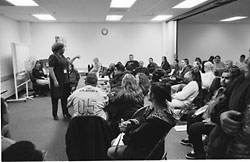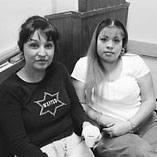|
 |
Parenting Classes Make a Difference
 |
| "It has been a blessing. I’ve learned a better way to raise my kids,” Mary. |
March 2002
While some clients and some members of the community may have a negative association with aspects of the child welfare system, there is one program that gets universal praise: parenting classes. “It has been a blessing. I’ve learned a better way to raise my kids,” states Mary, a single mother with five kids. “It is helping me understand myself and how to be a better parent,” comments Karina, who has six kids who are in the system.
About eight years ago a group of workers in the Los Angeles Covina office got together on their own to offer
parenting classes to their clients. At first the workers did it on their own time and paid for materials out of their own pockets. Gregg Fritchle recalls, “We wanted to do something for the parents. It started as a small group of workers, and now the program has grown. It wasn’t because the administrators said, ‘Let’s design a program.’ We did it, and it works.”
 |
| Parenting class instructors, Gail Cervantes (top) Social Workers Gregg Fritchle, Mary Nazemi, and Geoff Stephen (bellow) |
 |
“We started the program because the courts would tell parents, ‘Don’t hit your kids,’ but we didn’t tell them how not to hit them,” Virgie Boykin, the coordinator of the parenting program, explains. Before they started the classes, only private classes were available, and they were expensive and not very comprehensive. “Our clients have multiple problems and a lot of the private classes don’t address their issues. We handle everything they need to know to raise kids from prenatal to 18. We do contracting, behavior modification and a lot of modeling techniques. We teach them how the department [Department of Children and Family Services] works and how the court system works.”
The classes at Boykin’s office now serve 125 to 150 English-speaking and 25 to 50 Spanish-speaking parents per evening. About 150 parents graduate from the classes every three months. The classes are very effective. Parents who complete them have a 16% recidivism rate, compared to a 50% or 60% recidivism rate for parents who don’t attend the classes.
 |
| Bobby: “You don’t learn this stuff on the street. I had a lot of domestic violence issues and did not handle my problems well. Now I’m learning to communicate and listen to the other person. They didn’t teach us that in school. You learn violence more than anything. Everyone is fighting. This has been a change of pace. They forced me to come here, but I wish I came here a long time ago.” |
 |
| Karina and Valerie Valerie: “I had a lot of anger. Everything my son did bothered me. He would do things just to annoy me and push me. Now it is different. I’ve learned to ignore him or use a time out.” |
 |
| Fred and Larry Larry: “The class gives you a place to talk about what is going on. Normally you can only talk about it with your wife.” |
In a more traditional society, young parents would have their own parents, grandparents, and neighbors to teach them and to help out. In today’s urban cultures, young parents may hardly know their neighbors, and their families may live in other cities, states, or even other countries. Parents may not have anyone to turn to for help. “We no longer have a village to help raise children,” explains Gail Cervantes, who was one of the people who helped set up the parenting classes. “We provide the knowledge that was once handed down generation to generation. We teach them about developmental milestones; a parent may try to make a six-month-old baby walk, because they have seen another baby that age walking. We answer questions about what to do if your kids won’t do their chores. We teach them how to ‘show, not tell,’ to teach their kids to wash the dishes by showing them, for example, and that this is a time for bonding. This is a time to talk to them while you are teaching them.”
Generational Cycles
Cervantes even teaches her clients how to date. “We have ladies who have had kids with gentlemen with whom they had a one-week romance, and then do it again and again. We explain that the local night club is not a good place to go on a first date. You can’t hear each other or talk. We teach them to get to know the other side of the family before they start having children. They need to know this in order to show their teenage children how to date. It is a second and third generational type of thing. We even role play teaching their children how to date.”
Peer Teaching
One of the best things about the classes, according to social worker Mary Nazemi, is that the program allows parents to interact with each other and learn from each other. They try out the techniques at home and then share the experience in class. “We allow the students to share their own experience, and that is a valuable thing. They learn from each other so they can find the solutions themselves.”
Ironically, in spite of the success of the program, administrators have repeatedly tried to kill the parenting classes. Social workers teach the classes after doing their regular assignments, and according to social worker Geoff Stephen, management resented paying overtime. Management tried to use the excuse that parents could take private classes, even though the classes are expensive and not adequate. However, the workers organized the community, which protested the threatened closing to the board of supervisors. Management backed off.